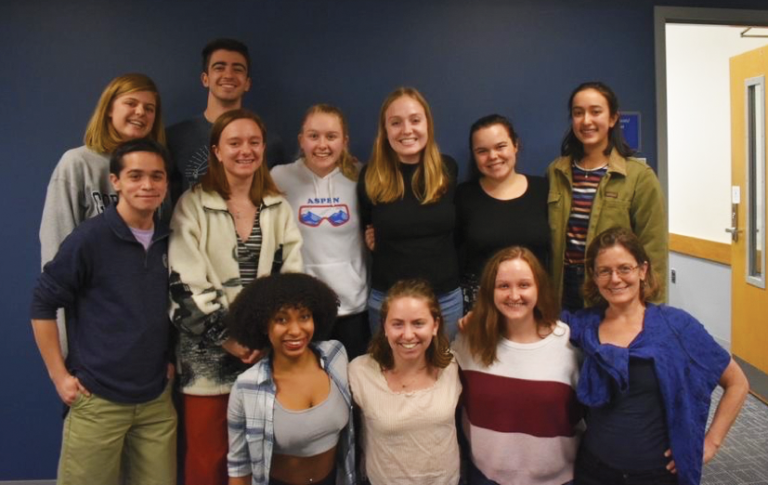Sara Collina
G+JI Faculty Fellow 2021

Sara Collina, J.D., Lecturer, Women’s and Gender Studies Program, Georgetown University
Sara Collina (she/her) teaches courses on gender and the law at Georgetown Women’s and Gender Studies Program, and recently worked with students to create a new course, Title IX for a New Generation. Sara is a gender justice advocate for the state of Maryland; in 2018 she helped to establish the state’s first sexual harassment training for legislators, and in 2019 she helped to create an X gender marker for driver’s licenses. Sara holds a B.A. from Cornell University and a J.D. from Berkeley Law School. Learn more about Sara Collina.

Learn about the course, process and team behind the Title IX for a New Generation on their website.
Explore the Syllabus.
Research Project: Title IX for a New Generation – A Course Evaluation
What is your research topic and why?
In the summer of 2019, a group of students and I created a new undergraduate course, Title IX for a New Generation. Its purpose is to inspire and empower Georgetown students to find new ways to make Title IX work for everyone. Using existing data, some additional qualitative interviews, and an analysis of relevant literature, I analyzed our progress in developing and piloting this course, and compared our work to similar efforts.
Main Research Question(s)
To what extent did Title IX for a New Generation meet its goals? To what extent are other universities providing similar courses and what can we learn from each other? And because of COVID-19, we added a third question: how has COVID-19 impacted Title IX awareness and prevention efforts?
Research Methodology
We reviewed existing student evaluation and peer mentor evaluation forms. We analyzed 32 university course offerings and surveyed – by email and phone – students from each of these universities to better understand Title IX efforts during COVID-19. And we conducted a literature review on innovative pedagogical approaches to undergraduate education.
Significant or Surprising Findings
We were not completely surprised to learn how many Title IX programs were canceled or postponed because of COVID-19, but were discouraged to hear from so many students that those programs “don’t matter anyway.” Given the epidemic of sexual harm on campuses across the country, it surprised us that so few universities had any academic spaces for students to explore the vexing public policy problem.
We know that our course is unusual, but are disappointed to learn just how unusual. It appears that the creativity reflected in the pedagogy literature has not reached many students.
Summary of Findings or Progress:
We reviewed existing student evaluation and peer mentor evaluation forms. We analyzed 32 university course offerings and surveyed – by email and phone – students from each of these universities to better understand Title IX efforts during COVID-19. And we conducted a literature review on innovative pedagogical approaches to undergraduate education.
Our literature review confirmed our belief that the entire concept of teaching is being reimagined by scholars of pedagogy. Research has shown that most of what we call “traditional learning” is remarkably ineffective. Innovations abound: flipped and project-based learning, learning-centered and student-centered curricula, contract grading and ungrading are among many other creative ideas for “doing education better.” Although uncommon, the concept of students as co-creators of their own learning has been shown to be promising. The model of students themselves developing a course based on their own priorities is at the core of Title IX for a New Generation.
Our analysis of Title IX New Gen student and mentor evaluations confirmed our hypothesis that students both appreciate –and perceive themselves to be more engaged with– a learning environment that provides significant autonomy. We found that the course would benefit from even more mentor-student interaction, and note that grading continues to be a struggle, as student-teachers sometimes disagree about the purpose of grades. Overall, students expressed deep appreciation for having a learning space that so intentionally learner-centered.
Our analysis of other university efforts shows a very lap gap between theory and practice. It seems that most undergraduate classes are still taught using traditional teaching strategies. The breadth and depth of innovation described in the literature were nowhere to be found in the courses actually offered to students. A few universities offer classes that are specifically labeled as “project-based” and only one offered any classes that are co-created by students.
The topic of Title IX was equality elusive. Quite a few universities offer classes related to gender and public policy, but only a couple offer courses that specifically focus on Title IX. We found no classes that focused exclusively on Title IX. In other words, at least in this group of universities, students serving as co-creators of their curriculum is extremely rare, and courses specifically focused on Title IX are nonexistent.
Although our analysis only covers the thirty or so universities that participated in the Sexual Misconduct Climate Survey, we also conducted a less formal search of another 20 universities and found similar results. We can conclude that Title IX for a New Generation is an unusual, and possibly unique, course. Given the enthusiasm for the course here at Georgetown, we feel that this course can serve as a model for other communities struggling with how to address gender discrimination, and specifically sexual harm, on campus.